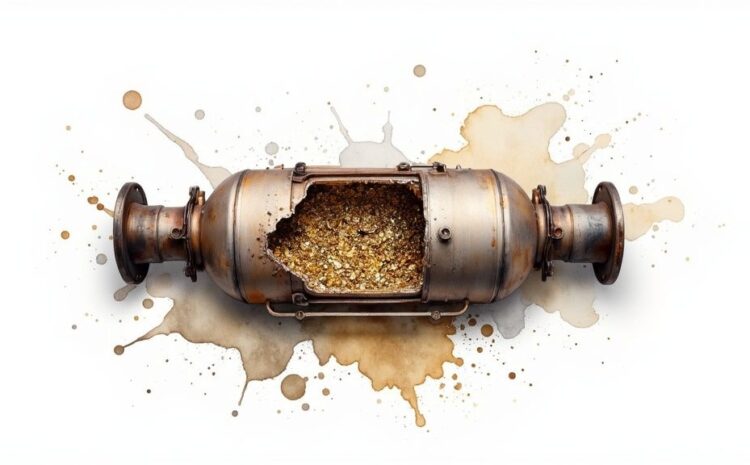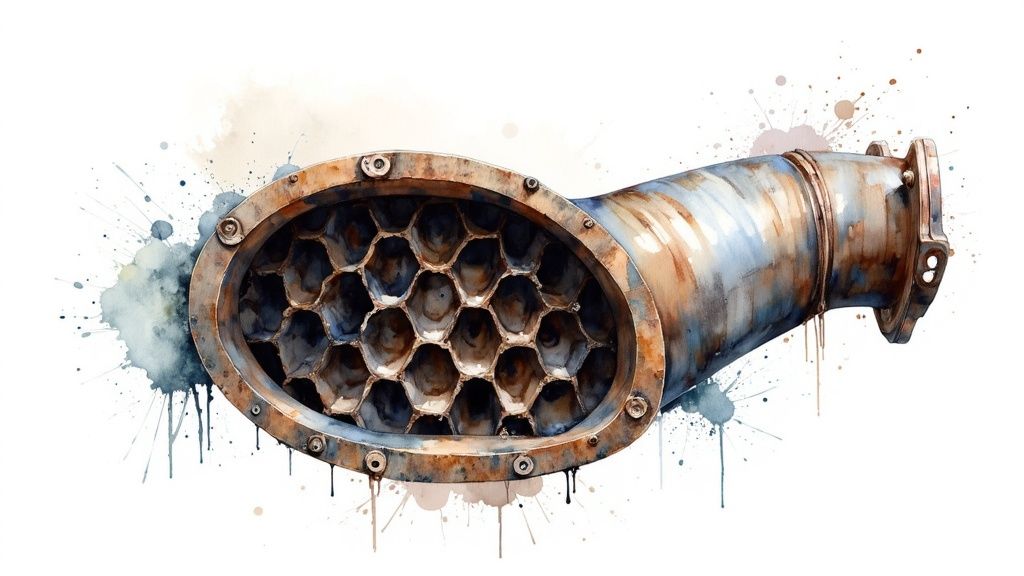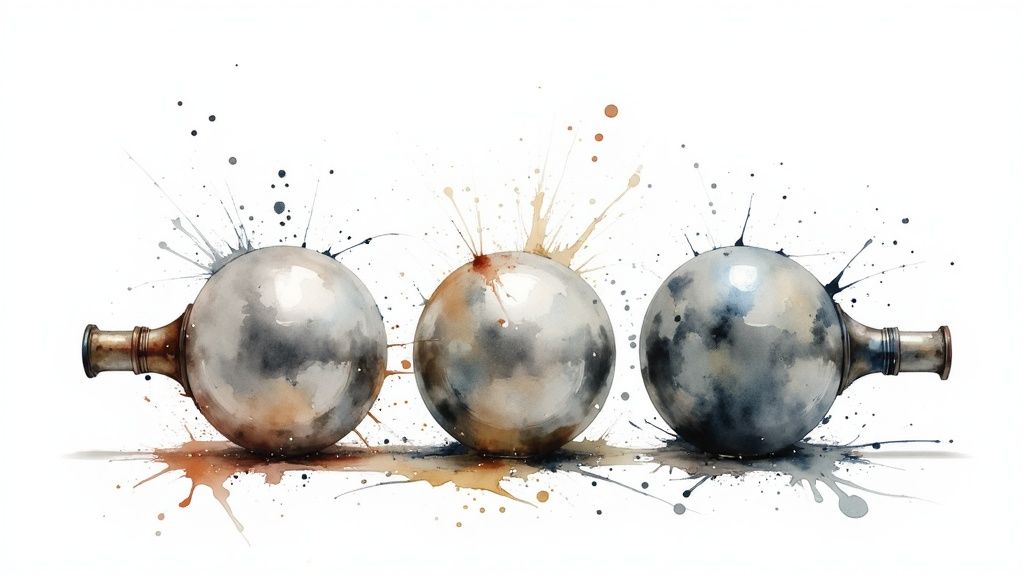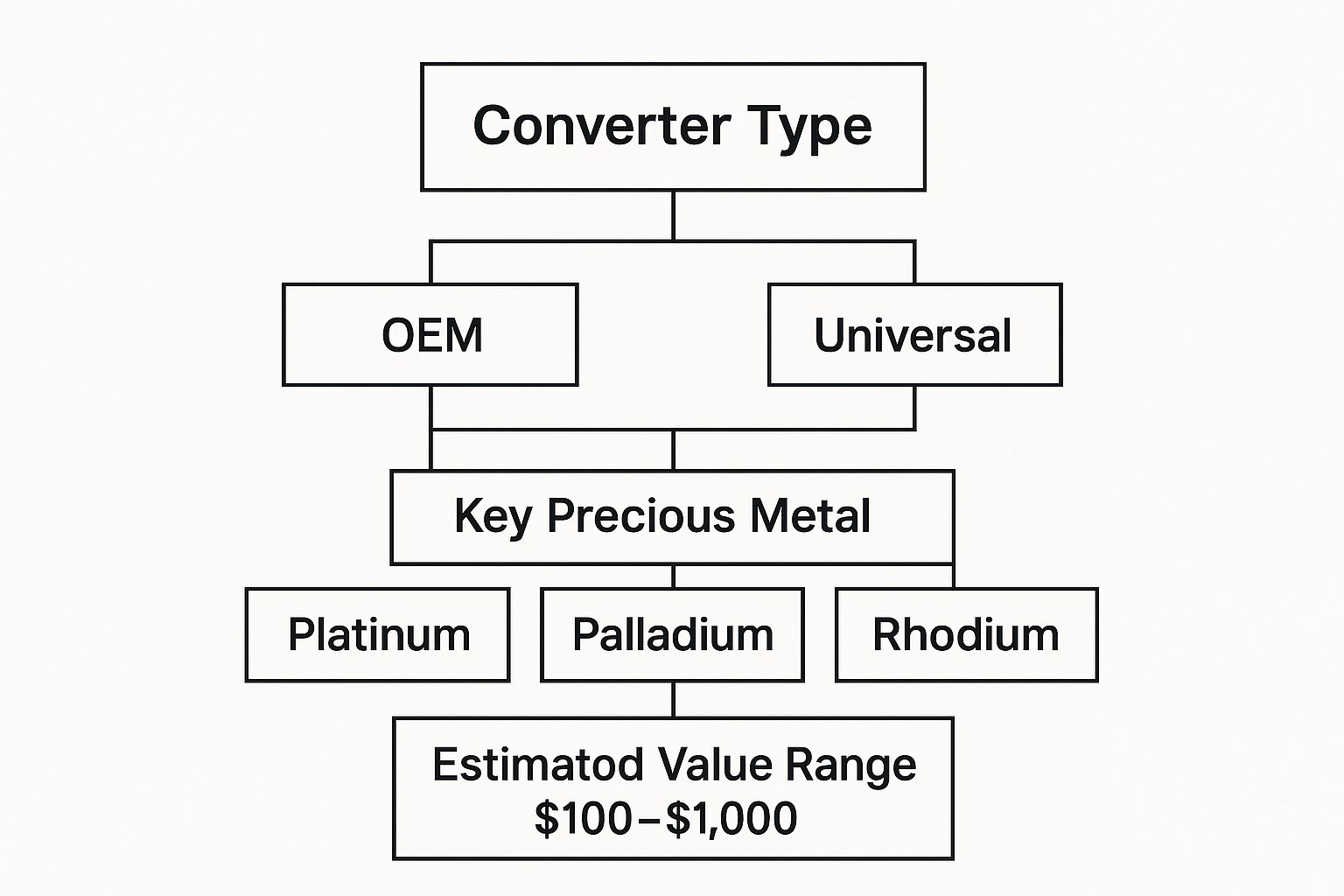
How Much Is a Catalytic Converter Worth? Find Out Now
You might be surprised to learn that the scrap value of a catalytic converter in the UK can be anywhere from £10 for a common one to over £500 for a particularly rare model. This huge difference in price comes down to the small, but incredibly valuable, amounts of precious metals tucked away inside.
So, What's a Scrap Catalytic Converter Really Worth?

It helps to think of a catalytic converter less as a typical car part and more like a little treasure chest bolted to your exhaust pipe. The outer steel casing isn't the prize; the real value is in the unique blend of precious metals coating a ceramic honeycomb structure inside. These are the metals that do the hard work of cleaning up your car's emissions: platinum, palladium, and rhodium.
The price you'll get for yours depends entirely on that specific metallic recipe and what those metals are worth on the day you sell.
A common mistake is to assume a bigger converter means a bigger payout. It's not about size. The concentration and type of precious metals are what truly matter. A small converter from a hybrid vehicle could easily be worth more than a huge one from an old van.
Understanding the Price Differences
Several key things come together to determine the final quote for your specific converter. Getting to grips with what makes one unit more valuable than another is the key to understanding its worth.
The main factors at play are:
- Precious Metal Content: The exact quantity and combination of platinum, palladium, and rhodium inside.
- Vehicle Make and Model: Certain cars, particularly hybrids, need converters with a richer mix of metals to meet emissions standards.
- Original vs. Aftermarket: Original parts fitted at the factory (OEM) almost always contain far more precious metals than cheaper, third-party replacements.
- Live Market Rates: The value of these metals goes up and down daily on the global commodities market, just like gold or silver.
For a quick reference, here's a general idea of what you might expect based on the type of vehicle the converter came from.
Estimated UK Catalytic Converter Scrap Price Ranges
This table offers a snapshot of typical price ranges. Remember, these are estimates, and the actual value depends on the specific factors we've discussed.
| Vehicle Type | Estimated Scrap Value Range |
|---|---|
| Small Petrol Cars | £40 – £150 |
| Family Saloons/Hatchbacks | £80 – £250 |
| Performance/Prestige Cars | £150 – £400+ |
| Hybrid Vehicles | £200 – £500+ |
| Light Commercial Vans | £60 – £200 |
As you can see, the variation is significant. A part from a small run-around is valued very differently from one designed for a high-performance or hybrid engine.
Understanding these variables is the first step, but it's important to remember the converter is just one part of the equation. Getting a full picture of the overall scrap value of your car will help you understand its complete financial potential when it reaches the end of its life.
The Hidden Value in Precious Metals

So, what makes a humble bit of your exhaust system so valuable? The secret isn't in the steel casing but within the fine ceramic honeycomb tucked inside. This intricate structure is coated with a cocktail of incredibly rare and precious metals.
Think of it as a tiny, highly efficient chemical plant. As your car's exhaust fumes pass through, these metals trigger reactions that convert nasty pollutants into much safer gases before they hit the atmosphere.
The real heavy lifters in this process are three specific metals from the platinum group, each with a crucial job to do:
- Platinum (Pt): A true workhorse, it tackles nitrogen oxides and carbon monoxide.
- Palladium (Pd): This metal excels at neutralising unburnt hydrocarbons and carbon monoxide.
- Rhodium (Rh): The most effective of the trio, its main job is converting harmful nitrogen oxides into harmless nitrogen.
These metals aren't just expensive – their value is constantly shifting on the global commodities market. This means the price of a catalytic converter can change daily, much like gold or silver.
Global Forces and Local Prices
The value of these metals is tied to all sorts of international factors. A mine strike in South Africa, a new emissions law passed in Germany, or a change in automotive manufacturing in Asia can all send prices up or down.
This is precisely why we've seen a huge spike in catalytic converter theft across the UK. The high value makes them an easy target.
The soaring market value of these metals means certain catalytic converters can be worth up to £1,000. This price is fuelled by a combination of high global demand and ever-tightening emissions laws, making them a hot commodity for thieves. You can learn more about the value of catalytic converters on Scrap Car Comparison.
This direct link to the international markets is why the answer to "how much is my catalytic converter worth?" can be so different from one week to the next. The quote you get is a snapshot of that day's live metal prices.
Key Factors That Influence Your Price
Just like no two cars are identical, the value of a catalytic converter can vary wildly. It’s not a one-size-fits-all situation. Understanding what drives the price up or down is the key to knowing what your old one is really worth.
The biggest factor by a country mile is whether the converter is an Original Equipment Manufacturer (OEM) part or a cheaper aftermarket replacement. OEM units are the ones fitted in the factory when the car was first built. To meet the manufacturer’s strict emissions standards, they’re packed with a much higher concentration of precious metals. Aftermarket parts, on the other hand, are designed to be affordable replacements, so they often contain the bare minimum of these valuable materials.
Vehicle Make and Model Specifics
The type of car your converter comes from plays a huge role in its value. For example, hybrid vehicles like the Toyota Prius often have some of the most valuable converters on the market. Why? Their petrol engines don't run constantly, so the metals inside don't degrade as quickly, leaving more to be recovered when it’s time for recycling.
It's a similar story for high-performance or luxury cars. Their bigger engines produce more emissions, so they need more powerful converters to clean them up. That usually means a richer loading of platinum, palladium, and rhodium. The image below breaks down how these factors all add up.

As you can see, OEM converters fetch higher prices simply because they contain more of the good stuff. The specific recipe of metals inside, which is dictated by what that particular car needed, directly determines where it lands on the value scale.
This value isn't set in stone, either. The precious metals market is incredibly volatile. We've seen reports of average values jumping by 40.82% in a single year, only to be followed by market corrections. On a shorter timeline, prices can swing by 9-13% in just one month. This is why it’s so important to get a quote based on live market rates, not yesterday's prices.
Ultimately, getting your head around these variables is a massive part of learning how to scrap your car for the best value.
How a Reputable Dealer Works Out the True Value

If you're dealing with a professional scrap buyer, they won't just pull a number out of thin air. Getting a proper valuation for a catalytic converter is a precise, data-backed process that leaves no room for guesswork and makes sure you get paid what you're owed.
The whole thing hinges on one key detail: the serial number or part code stamped onto the converter's casing. Think of this code as the unit's unique fingerprint. It tells the dealer everything they need to know, including the exact make, model, and year of the car it came from.
With that code in hand, they can pinpoint the converter in a massive database. This isn't just a list of parts; it's more like a detailed recipe book, spelling out the exact blend and quantity of precious metals inside that specific unit, often measured down to the gram.
From Data to a Real-Time Quote
Once they know the exact metal content, the next step is connecting it to the real world. A final value is calculated by lining up the amount of platinum, palladium, and rhodium in your converter with the live, up-to-the-minute prices on the global commodities market.
This completely transparent method means your quote is based on two solid, verifiable facts:
- The exact quantity of precious metals inside your specific unit.
- The live market value of those metals at that precise moment.
Many professional dealers work closely with or are part of established automotive workshops, which gives them the tools and expertise to carry out these detailed assessments and ensure every valuation is spot-on.
This is what sets a proper dealer apart. It builds trust by showing you the price isn't just a whim but is directly tied to real, verifiable market data. It’s your best protection against a vague estimate or a lowball offer.
Ultimately, this process guarantees you receive a fair and accurate price that reflects what your catalytic converter is genuinely worth. It provides complete peace of mind and confidence that you're getting a good deal.
Getting a Professional Quote for Your Converter
So, with all these factors in play, how do you find out exactly what your catalytic converter is worth? Thankfully, you don't need to be a precious metals trader to get a solid price.
The most reliable way to get an accurate quote is to find the part number stamped directly onto the converter's shell. If you can't get to it, don't worry – your vehicle's registration number is usually all a specialist needs to identify the correct part.
Turning Your Details into a Quote
Once you have this information, a professional service like Fast Scrap Car can give you a precise, up-to-the-minute quote. Their system instantly matches your converter’s details with its specific precious metal content and the live market prices. This ensures the price you get is fair and transparent.
It really is a simple process:
- Submit Your Details: Provide your vehicle's registration or the converter's part code.
- Receive Your Quote: Get a no-obligation price based on real-time market data.
- Arrange Collection: If you're happy with the offer, just schedule a convenient pickup time.
Here's the logo of Fast Scrap Car, a service that simplifies this process.
Going through a professional service means you get a competitive price without any of the usual hassle.
This data-led approach removes all the guesswork. You receive a quote that reflects the true market value, giving you the confidence that you are getting the best possible price for your scrap part without any haggling.
This is by far the most dependable way to cash in on the value tucked away in your old converter. If you're getting rid of the whole vehicle, it's also worth understanding how to scrap your car to make sure the entire process is handled properly from start to finish.
Here's the rewritten section, designed to sound natural and expert-written:
Common Myths About Catalytic Converter Value
When you start looking into scrap catalytic converter prices, you'll quickly run into a lot of myths and dodgy advice. It's easy to get your expectations skewed. Let's cut through the noise and tackle a couple of common misunderstandings that could cost you money.
The biggest one? That all catalytic converters are a goldmine. Sure, you hear stories about massive payouts, and some can be incredibly valuable. But the truth is, prices are all over the place. The cat from your average run-around hatchback will be worth a lot less than one from a high-performance sports car or, especially, a hybrid. Thinking every single one is a lottery ticket is the quickest way to feel let down.
Size Versus Substance
This next one catches a lot of people out: the idea that a bigger converter means a bigger cheque. It seems logical, but it's just not how it works. The physical size of the unit has almost no bearing on its actual scrap value.
What really drives the price is the concentration of precious metals packed inside. Think of it like a tiny, high-tech sponge. A small, compact converter from a Toyota Prius, for instance, is often loaded with a much richer coating of platinum, palladium, and rhodium than a bulky converter from an old builder's van. It’s the quality of what’s inside the can that matters, not the size of the can itself.
One of the worst things you can do is sell your converter for quick cash to some bloke you found online. Not only is this illegal under the Scrap Metal Dealers Act 2013, but you’re also setting yourself up to be ripped off. Unlicensed buyers will nearly always lowball you and won’t provide any paperwork, leaving you with no proof you disposed of it legally.
This is exactly why going with a fully licensed and reputable service like Fast Scrap Car is so important. You get a genuine, data-driven valuation, the whole process is transparent and by the book, and you can be confident you’re getting a fair price. It’s about protecting yourself and getting what your part is truly worth.
Got Questions? We've Got Answers
To finish up, let's tackle a few of the most common questions people ask us. This should help clear up any lingering thoughts about what your catalytic converter might be worth.
Which Cars Have the Most Valuable Catalytic Converters?
It might surprise you, but hybrids often top the list. Cars like the Toyota Prius or certain Honda models have converters that fetch a high price. Why? Their petrol engines aren't running constantly, so the precious metals inside don't degrade as quickly, meaning there's more left to recover.
Of course, high-end performance and luxury cars are also in the running. Brands like Ferrari, BMW, and Mercedes-Benz often pack their converters with a higher concentration of precious metals to handle their powerful engines and meet strict emissions rules.
Can I Just Cut Out the Catalytic Converter and Sell It Myself?
Technically, you could try, but we really wouldn't recommend it. For starters, it’s a difficult job that requires specialist tools and a good understanding of what you're doing to stay safe.
More importantly, it’s a legal minefield. Under the Scrap Metal Dealers Act 2013, no reputable scrap dealer can legally hand over cash for a loose converter. They’ll also need solid proof that you own the car it came from. The simplest, safest, and most legally sound way to get paid is to sell the whole car to an Authorised Treatment Facility.
Trying to sell a catalytic converter on its own to an unlicensed buyer is not just risky; you’ll almost certainly get a bad price. Sticking with a professional service that handles the entire vehicle is always the best bet.
How Can I Stop My Catalytic Converter from Being Stolen?
A few simple precautions can make a big difference. Always try to park in well-lit areas or, even better, a locked garage. You could also ask a mechanic to etch your vehicle's registration number onto the converter, which makes it much harder for a thief to sell on.
For an even stronger deterrent, consider fitting an anti-theft device like a protective cage that gets welded to your car's frame. It’s a solid investment in peace of mind.
Ready to find out what your old car is really worth, parts and all? Get a quick, honest, and completely transparent quote from Fast Scrap Car today. We make the whole process easy, right down to the free collection. Head over to https://fastscrapcar.co.uk to get started.
